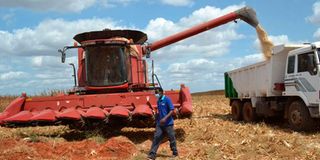Galana Kulalu panacea for hunger disease

A combine harvester loads maize onto a truck at the Galana-Kulalu Food Security Project. The Ruto government should prioritise the resuscitation of the project if, indeed, it is serious about solving the food insecurity menace.
What you need to know:
- Unless the population is food-secure, we cannot talk about development.
- Majority of the countries that have attained the middle-income economic status first solved the issue of food security.
- It is possible for Kenya to produce enough maize and pulses to feed its population and even export.
President William Ruto, in his inaugural speech after being sworn in on September 13, announced sweeping reforms, including ending the Unga and fuel subsidies.
He pointed out that the subsidy programme was not only untenable but also open to blatant abuse.
That left Kenyans with many questions. They now hope the Ruto administration will lay bare how the programme was abused by the government of his predecessor, President Uhuru Kenyatta.
Granted, food production is key to the growth of our economy. Unless the population is food-secure, we cannot talk about development.
Majority of the countries that have attained the middle-income economic status first solved the issue of food security.
A hungry nation will always remain angry. The fact that we look up to imports to satisfy our hunger explains our problems.
However, it is possible for Kenya to produce enough maize and pulses to feed its population and even export.
Obstacles
As much as I welcome the fertiliser subsidy, this will not be enough to stimulate enough production. But obstacles stand in its way.
Adverse weather conditions, diversification from farming and urbanisation have dealt a major blow to our food production. The government must, therefore, seek alternative and more efficient methods of production.
The Galana Kulalu irrigation scheme is one of the low-hanging fruits that the government can use to boost our production and, hence, get the solution to the perennial hunger situation.
The 1.8 million acres can produce not less than a billion bags of maize every season.
Due to unpredictable weather patterns, it is almost impossible to project any form of production based on rain-fed agriculture.
The Ruto government should, therefore, prioritise the resuscitation of the Galana Kulalu project if, indeed, it is serious about solving the food insecurity menace.
It is laughable that the Jubilee government could only implement the project by contracting a foreign entity.
The country has many top-notch agricultural researchers, policy wonks and unemployed youth.
Why can’t we have a massive recruitment of the youth, under the National Youth Service, to work on this project?
That will first change the perspective of our young people on agriculture besides offering affordable labour to the much-needed exercise of feeding the people.
There are a myriad well-managed food security projects across the world that the government can tap from.
Only optimal production of cereals and pulses will help us to achieve the Kenya Vision 2030 economic blueprint and all our other dreams.
Innocent Musumbi Kimanthi, Machakos




